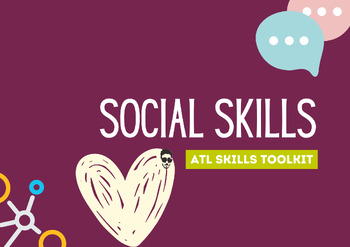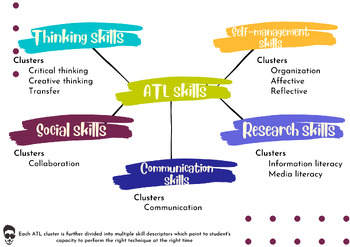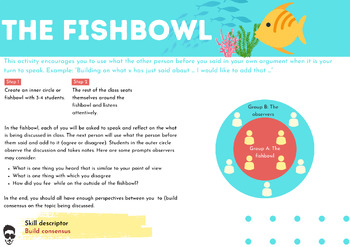ATL Skills Toolkit - Social Skills
Tarek Salama
4 Followers
Grade Levels
PreK - 12th, Higher Education, Adult Education, Staff
Resource Type
Formats Included
- PDF
Tarek Salama
4 Followers
Description
- Communication: Effective communication is fundamental to social interaction. This includes verbal communication (speaking clearly, listening actively, and expressing oneself articulately) as well as nonverbal communication (body language, facial expressions, and tone of voice).
- Empathy: Empathy involves understanding and sharing the feelings and perspectives of others. It enables individuals to connect emotionally with others, show compassion, and respond sensitively to their needs and experiences.
- Active Listening: Active listening involves fully concentrating on what another person is saying, understanding their message, and responding thoughtfully. It shows respect and fosters deeper understanding and rapport in conversations.
- Assertiveness: Assertiveness involves expressing one's thoughts, feelings, and needs honestly and respectfully while also respecting the rights and boundaries of others. It helps individuals advocate for themselves, set boundaries, and negotiate effectively in social interactions.
- Conflict Resolution: Conflict is a natural part of social interaction, and conflict resolution skills are essential for resolving disagreements and maintaining positive relationships. This includes techniques for managing emotions, finding common ground, and seeking mutually acceptable solutions.
- Self-Awareness: Self-awareness involves understanding one's own emotions, thoughts, strengths, and weaknesses. It helps individuals regulate their behavior, manage stress, and adapt to different social situations effectively.
- Social Etiquette: Social etiquette refers to the accepted norms and manners governing behavior in social settings. This includes politeness, respect for others, and adherence to cultural and societal expectations.
- Teamwork and Collaboration: Working effectively in groups or teams requires skills such as cooperation, compromise, and leadership. Individuals must be able to communicate openly, contribute ideas, and coordinate efforts to achieve common goals.
- Friendship Skills: Building and maintaining friendships involves skills such as initiating conversations, showing interest in others, being supportive, and resolving conflicts constructively.
- Flexibility and Adaptability: Social situations can be unpredictable, and individuals need to be flexible and adaptable in their interactions. This involves being open to new ideas, adjusting to different personalities, and navigating changes gracefully.
Developing strong social skills is important for success in various aspects of life, including personal relationships, academic pursuits, and professional endeavors. These skills can be cultivated through practice, feedback, and reflection, and they play a vital role in promoting positive social interactions and overall well-being.
Total Pages
Answer Key
N/A
Teaching Duration
N/A
Report this resource to TPT
Reported resources will be reviewed by our team. Report this resource to let us know if this resource violates TPT’s content guidelines.




